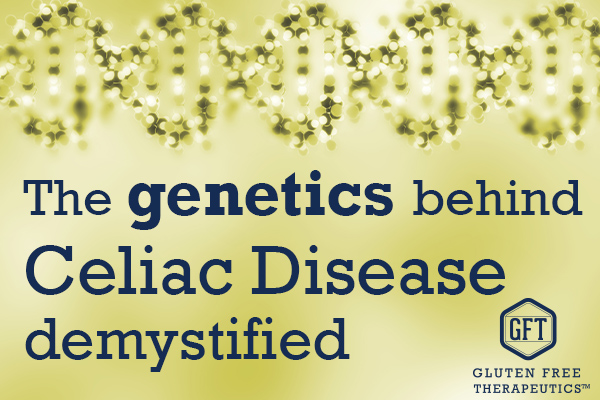
The facts about genetic testing for celiac disease
Why do a genetic test for celiac disease? As we know celiac disease is genetic so many doctors advise genetic testing. Genetic testing can be used to rule out celiac disease when a patient is already on a gluten-free diet or test results are inconclusive. Once one family member is diagnosed with celiac disease doctors often encourage first degree relatives to get antibody testing (every 3 years or immediately if symptoms develop). Genetic testing can be done by blood test, saliva test or cheek swab. Genetic testing is not a diagnosis of celiac disease nor does it mean you will ever develop celiac disease. To diagnose celiac disease there is a separate set of testing methods. Keep in mind that positive antibody or genetic test results only suggest the presence of celiac disease—the test results cannot confirm it. If these screening tests come back positive, the next step in diagnosing celiac disease is to get a biopsy of the small intestine.

Celiac disease genetic testing looks for two genes.
The Genetics of Celiac Disease
The majority of people diagnosed with celiac disease share common genes. Gene are inherited, one copy comes from your mother and one from your father. Among all of the possible HLA genes, greater than 90% of patients have at least one copy of a gene called HLA DR3-DQ2.5, sometimes those with celiac disease have 2 copies of this gene. Other common HLA genes in celiac patients include DR4-DQ8. Harboring these genetic variants is not enough to develop celiac disease; these genes are common in the general population. Patients with 1 or 2 copies of DR3-DQ2.5 have a greater risk of developing the disease than those with 1 or 2 copies of DR4-DQ8.
Why are HLA genes important?
HLA stands for Human Leukocyte Antigen and produces the protein that holds small pieces of foreign material (viruses, bacteria) on the surface of a cell so that it can be recognized by white blood cells. When such foreign material is recognized by while blood cells, the immune system can then attack the foreign invaders in order to protect the body. In the case of celiac disease, the HLA molecule probably presents fragments of gluten in an imprecise way, so that it too is recognized as a foreign invader and attacked for destruction. Your own tissues are innocent bystanders that also get attacked while the body tries to rid the system of gluten. Certain HLA variants are probably more likely to form an imprecise interaction with white blood cells and allow this incorrect interpretation to occur.
What is new in the field of celiac genetics?
In a recent study published in the New England Journal of Medicine, Edwin Liu and co-authors examined a group of children with the genes listed above to determine their risk of developing celiac disease. Among 6403 children followed in the U.S and Europe, 12% developed celiac autoimmunity, defined as an elevated anti-tissue transglutaminase antibody on 2 consecutive doctor’s visits.
The risks for developing celiac autoimmunity and biopsy positive celiac disease by the age of 5 were 11% and 3% among those with a single copy of DR3-DQ2.5, and 26% and 18% among those with 2 copies of DR3-DQ2.5. Relative to those with 1 or 2 copies of DR4-DQ8, children with one copy of DR3-DQ2.5 were 2 times more likely to develop celiac disease, and those with 2 copies of DR3-DQ2.5 copies were 6 times more likely.
An additional risk factor for developing celiac disease was living in Sweden. Relative to children in the U.S., those with susceptible genotypes in Sweden were almost twice as likely to develop celiac disease. The reasons for a higher risk in Sweden are not evident, but environmental factors are likely at play.
What does this mean to me?
Since most patients carry 1 or both of the HLA alleles described above, understanding your genetic susceptibility may help you rule out the condition if you and your doctor are unsure of your diagnosis when testing for celiac disease. The most important use of the findings from this study may be increased screening of 1st and 2nd degree relatives of those with celiac disease at a young age, to enable early detection and treatment.
This information is provided by GFT to inform and educate. It is not to be a substitute for medical advice. We recommend that this and any other medical conditions be discussed with a medical health professional.
This original article is made possible by Gluten Free Therapeutics. Our mission is to educate, inform, and provide the most effective nutritional products possible to allow those with celiac disease and serious gluten intolerances to heal their bodies. CeliVites complete line of superior gluten free supplements includes multivitamin/multimineral supplements, iron supplements, and calcium supplements for people living with celiac disease. All CeliVites products are designed to help you heal, restore and rebuild your body, because going gluten free isn’t enough!
Comments ()
















My 21 year old fraternal twin granddaughters were diagnosed with Celiac Disease at the age of 12. One is more sensitive than the other and has had many bouts of physical symptoms where she is very sick. Her Mom and Dad were tested negative and there is no history of the disease in the families that we know of. Her Mom had intravenous medication to aid in becoming pregnant, that seems to be the only outside connection to their genetics that I can see. Has there been any studies on this particular scenario that you know of.
We just found out last yr., that my 79 yr. old mother was just diagnosed with Celiac Disease. It was a long 4 yrs. past of colon tests and trips to the hospital of not knowning what was wrong with my mother. My younger sister age of 48 has it also with finding out last yr. as well. We are now very careful of what she can and cannot have in her diet. It is really tough sometimes, but it is well worth it.
My genetic test came back negative however my whole
Life I’ve suffered from diaestive issues , anemia
Hypothyroidism at the age of 28 , him issues
Horrible misscatiages etc celiac rash , I stoped eating
Gluten it all went away this means I’m Celiac ant
The test is not perfect
This is exactly my case. Help! I tested positive with my blood and biopsy. My dad carries the gene and we think my grandmother had CD undiagnosed bc of her neuropathy and extreme intestinal issues. I just got a negative genetic test. So do I hold on to the diagnosis bc of the positive biopsy and blood or does it get over turned with my negative genetic test?